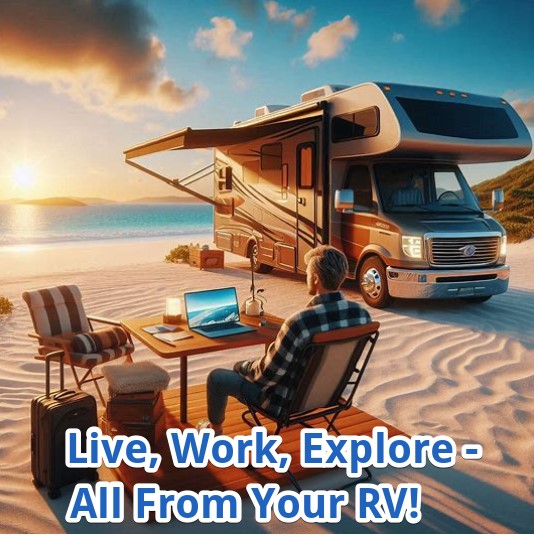Getting started with RV homeschooling comes with the excitement of adventure and the promise of unique learning experiences. There’s a certain freedom that many have yet to explore, and taking school on the road is just the way to do it.
New to this style of learning? No worries. First thing, it’s all about gathering the right resources. Books and educational tools are essential, but with a twist. Opt for digital versions when possible, since they save space and add a bit of convenience.
It’s also key to set realistic expectations. Life on wheels can be unpredictable at times. Some days, school may run a bit differently than others. It’s okay. Be flexible and let the journey teach you, too.
Before hitting the road, navigating legal requirements is critical. Each state can have varied rules about homeschooling, so it’s wise to check them out before you roll out. Keep records and portfolios in order. They’ll serve you well down the road.
Homeschooling while traveling has its charms, especially when it comes to blending in local culture and historical sites into the curriculum. Learning about the Civil War while standing at Gettysburg? Unmatched.
The key takeaway is that RV homeschooling is prepared and adaptable. Enjoy the miles and the milestones.
Creating a Structured, Yet Flexible, Curriculum
Learning on the road demands a curriculum as flexible as your itinerary. The balance between structure and spontaneity is a game-changer. While lesson plans form a foundation, there’s magic in organic learning moments.
Incorporating local culture and experiences into studies isn’t just fun; it’s enriching. Crowded museums, bustling markets, and serene parks can all be classrooms. Dive into a city’s history as you walk its streets, or explore ecosystems by simply stepping outside your RV. These real-life adventures align seamlessly with subjects like geography, history, and science.
Different learning styles are essential to acknowledge, too. Your child might be a budding artist who thrives on visual stimuli or a hands-on learner eager to build and create. Tailoring lessons with this in mind not only makes learning more engaging but also ensures it’s effective. So mix things up: include videos, interactive activities, and field trips.
With the digital age in full swing, online tools offer support beyond just textbooks. Websites with virtual tours, educational apps, and online forums can enhance the RV homeschooling experience. Connecting with other traveling families via these platforms can provide shared resources and camaraderie.
Finding the sweet spot between structured lessons and spontaneous exploration elevates the homeschooling experience. It opens minds and keeps every day as exciting as the open road.
Fostering Socialization Opportunities on the Move
One of the top concerns for RV homeschooling families is socialization. Without a traditional school playground, you’ll need to think outside the box to keep those social skills sharp.
Connecting with local homeschooling groups in different areas is a fantastic way to meet new friends. Many of these groups welcome travelers, offering playdates, field trips, and even cooperative learning sessions. This not only gives your child a chance to make friends but also exposes them to a variety of backgrounds and perspectives.
RV communities also play a significant role in socialization. There’s a common bond among families who choose life on the road, creating instant connections wherever you park. By participating in campground activities or informal meet-ups, you can cultivate friendships and a sense of belonging no matter where you are.
Embracing technology for virtual meet-ups and online classrooms bridges the gap when physical proximity isn’t possible. Tools like video conferencing enable your children to participate in group projects or simply chat with peers. This can be particularly handy if you’re in a remote location.
Encourage teamwork and collaboration skills by involving kids in community volunteer efforts or group projects. This can teach them the importance of working towards a common goal and strengthen their ability to communicate effectively.
Socializing on the go is about making the most of every environment and opportunity. It’s not just about meeting new people, but building a network of fellow travelers and friends who enrich life on and off the road.
Time Management for Education on the Road
Juggling school with the thrill of travel keeps RV homeschooling vibrant, but it can be tricky. Time management becomes your best tool in ensuring everything runs smoothly without sacrificing the joys of life on the road.
Establishing a routine brings structure amid constant changes. While a strict schedule might not fit the bill, having a predictable flow to your days helps everyone know what to expect. This can include set times for lessons, meals, and free play.
Balancing educational activities and travel requires prioritization. When exploring a new area, lessons may revolve around the local environment, blending learning seamlessly with adventure. It’s about squeezing the most learning juice out of every stop without making it feel forced.
Making time for play and leisure is equally important. Kids learn a lot through play, and travel invites spontaneous fun. Whether it’s a hike in the mountains or a swim at the beach, these activities complement formal education and enhance their overall experience.
Utilizing tools and tips is a game-changer for efficient time management. Consider using planners or digital apps to track tasks and schedules. Sharing responsibilities among family members can ease the load and allow more focus on education.
Keeping your days organized without losing sight of the perks of RV homeschooling takes a bit of planning. But in exchange, it delivers a fulfilling blend of structured learning and adventurous living.
Incorporating Real-World Experiences into Homeschooling
Travel offers a unique edge in education: real-world experiences as a textbook. Always on the move, families have the chance to make destinations part of the lesson plan. Passing through the Grand Canyon? Use geography and geology for a rock-solid science lesson.
Nature provides countless teaching opportunities. Learning about ecosystems while hiking or observing wildlife brings biology to life. Discuss conservation issues right at the heart of many national parks.
Cultural experiences offer another rich seam to mine. Local festivals, museums, and historic sites provide ample material for subjects like history and social studies. This immersion can lead to deeper understanding and retention than traditional learning methods.
Encouraging curiosity and exploration is key. When kids ask questions or show interest in something new, it’s an opportunity to expand the curriculum. This approach builds critical thinking and problem-solving skills organically.
While traveling, documenting, and reflecting on experiences can deepen learning. Journaling about adventures or creating scrapbooks allows kids to process experiences and revisit lessons learned along the way. These projects can be both creative and educational.
As you journey across different terrains and cultures, integrating each new experience into homeschooling enriches your child’s education. It shapes a worldview that’s both broad and informed, offering insights no static classroom could replicate.
FAQ and Troubleshooting Common RV Homeschooling Challenges
Every great adventure comes with a few bumps, and RV homeschooling is no different. Addressing challenges head-on means smoother travels and a more enjoyable experience for the whole family.
Travel fatigue and burnout can hit when you’re constantly on the move. Keeping to a manageable pace and scheduling regular breaks helps avoid exhaustion. Downtime is important, so make sure to plan days for rest and relaxation.
Budget-friendly educational resources are a must. Look for free or low-cost online materials, visit libraries where you stop, and utilize community resources. Many museums offer free entry days or educational discounts, which can aid learning without breaking the bank.
Dealing with connectivity issues while on the road is part of the lifestyle. Investing in a mobile hotspot or signal booster can help, but also be prepared with offline activities and resources. Sometimes getting off the grid can lead to the most valuable lessons and experiences.
Beginner RV homeschoolers often ask about balancing curriculum needs with travel demands. It helps to blend learning into daily activities and be open to moving away from traditional teaching methods. Flexibility remains the cornerstone of homeschooling success.
Handling common questions and challenges ensures a more rewarding RV homeschooling journey. Every challenge is an opportunity for growth, adaptability, and deeper learning, which enriches the overall experience.
You can check out this article for more information about homeschooling in an RV.












Recent Comments